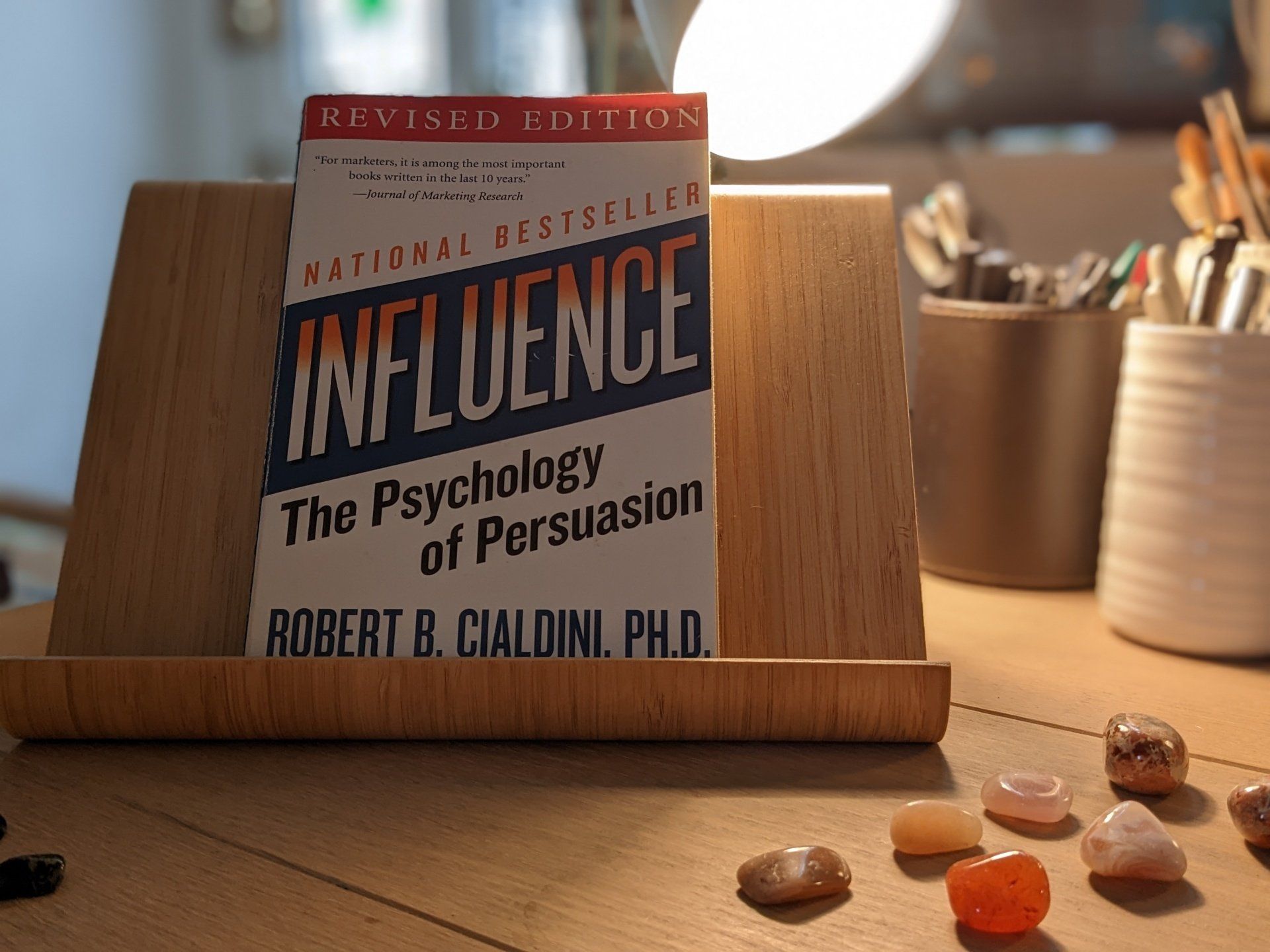The majority of influencing tactics fall within six basic categories governed by fundamental psychological principles that direct human behaviour. In his beautifully written book, Influence, Robert Cialdini reveals these tactics and shows us how unscrupulous 'compliance practitioners' prey on our
innate good nature to produce a 'yes' by making us believe they have our best interests at heart.
NOTE: This is a long read for those with an interest in this kind of thing. Otherwise, please skip to the 'takaways' with helpful ways to recognise influence triggers and how to deal with skilled persuaders.
I first read this book in 1994 and bought the revised edition in 2007 to update my library. It is as relevant today as ever before, perhaps even more so in terms of the global onslaught of persuasive tactics we have been subject to in recent years.
This is an important book because it makes us aware of some of the clever ways we can be hoodwinked or manipulated to agree to things we don't really want to agree to, or to invest in. Things which may turn out to be spurious, inappropriate, not good for us or simply 'too good to be true.'
This is where we need to understand that professional
'compliance practitioners' have much more than a vague and amateurish understanding of how the powers of persuasion work compared to the rest of us. In this day and age, it is the highly skilled marketers, orators and authority-type figures we need to be most cautious of and this book will help you to identify some of the tricks they use to make us comply.
It is not to be assumed that
all
'compliance practitioners' have dishonourable intentions. They are not the only ones using their skills of persuasion to get their way. We all employ persuasion tactics and fall victim to them in our interactions with family members, friends, loved ones, neighbours and offspring. The point is that our intentions are perhaps without exception honourable and considerate, and do not come with an ulterior or secret motive.
This is why it is helpful for us to gain a better understanding of the natural psychological tendencies that affect our behaviours from an individual and collective (crowd) perspective. It means we can better protect ourselves from automatic impulses and develop our own persuasive skills to help each other in a positive way. We can then understand how best to use our benign skills of influence to befriend like-minded people, keep the peace and care for each other in our local communities.
Introduction
The book starts with an introduction to a body of work that started with a question:
'What are the factors that cause one person to say 'yes' to another person?' In his role as an experimental social psychologist, Robert's research begins with the
'psychology of complicance' which led to the discovery of six principles of persuasion. This work is supported by experiments with college students and by closely observing the tactics of
'compliance professionals' who use fundamental principles of psychology to develop their
'weapons of influence.'
Weapons of influence
In the first chapter, Robert, who describes himself as 'an easy mark for the pitches of peddlers and compliance practitioners' explains how vulnerable we are when it comes to reacting to skilful persuasion. Throughout his research, he was astonished to discover just how common this problem is for other people as well. In turns out that most of us behave in a mechanical, tape-activated way to triggers which set off a pattern of behaviour he calls
'click and whirr' whereby we do things automatically as individuals or as part of a crowd.
There are three commonalties of
'weapons of influence' that we need to be aware of:
- Certain triggers can be used to activate a nearly mechanical process of behaviour.
- Persuasion tactics are a powerful tool for those who know how to use them against us.
- As amateurs or
'consumers', we underestimate how effective such persuasion tactics are.
The six principles are examined for their ability to produce a distinct kind of automatic, mindless compliance or
'cick and whirr' from people. That is, a willingness to say 'yes' without thinking. Here are four of the six principles in some detail (with takeaways) and short summaries of the remaining two at the end.
1) Reciprocation
The Rule of Reciprocation says that we should try to repay, in kind, what another person has provided for us.
If someone helps us out of their own volition, we feel obliged to do something in return. This is a wonderful thing in many ways. Even though it is a joy to help people and not expect anything in return, it makes your heart sing when you receive a heart-felt 'thank you' in a word, a card or a small gift. Reciprocating in this way strengthens relationships where each party feels happy to give and to receive as appropriate in the moment without any other requirements or expectations.
The problem is that this innate kindness can easily be manipulated by tricksters who give us 'free stuff' with the hidden objective of making us feel obligated to buy something that we may not need, want or desire in return. It reminds me of the warning:
'Nothing is ever free' and you have to hand it to the marketers, they are really good at giving stuff away as an introduction or taster to a hierarchy of increasingly expensive products or services that often turn out to be a complete waste of money.
Takaway 1:
It is suggested that if we find ourselves in the situation where we realise (after much attention) that the primary motive is to make us feel obliged to make a substantial unwanted investment, we should merely define whatever it is we have received up to that moment in time. This enacts the
'mental act of redefinition'
where we list
all that has been given as
'sales or other devices'
(remembering that they were never intended as gifts in the first place). This frees us to respectfully decline without feeling guilty about it.
2) Commitment and Consistency
The Rule of Consistency
'lies deep with us, directing
our actions with quiet power
[as it] is quite simply our nearly obsessive desire to be (and to appear) consistent with what we have already done.
It is true that in many circumstances consistency is valued and adaptive. It is an attribute normally associated with personal and intellectual strength based on logic, rationality, stability and honesty. Good personal commitment and concistency is highly valued as it provides us with a reasonable orientation to the world and shows that we can be depended upon.
With consistency being defined in this way, it is easy to fall into the trap of thinking 'that's it' and settling into a comfort zone that makes us impervious to change. Resorting to this kind of
'stubborn consistency' means we fail to identify incoming factual information that we need to weigh up in order to make informed decisions. This fails to serve us in a beneficial way and can quickly work against us.
This is where
'automatic consistency' acts as a shield against thought and it's a potential gold mine for exploiters who structure their interactions with us 'so that our own need to be consistent will lead directly to their benefit.'
A good example of this occurs at Christmas when a toy company promotes an expensive toy that become the most popular and expensive 'must have' gift for children in a particular age group. They then make sure the product is 'sold out' so that alternative toys are bought for Christmas day and customers come back to buy the expensive toy when it comes into stock in January - thus doubling their spend.
Takeaway:
The key here is to make a commitment to actively keep up with what is going on with questions, research and inner awareness. This takes time and effort but it is important to factor it into our daily lives so that we are open to new ideas and are prepared to make adjustments or changes that will be of benefit.
3) Social Proof
The Rule of Social Proof states that one means we use to determine what is correct is to find out what other people think is correct. The actions of those around us are important in helping us to define an answer.
A simple example is the use of 'canned laughter' by television executives as this has been shown to make an audience laugh longer and more often (especially at poor jokes). Even though we know full well that the hilarity is irrelevant to the humourous quality of the joke, and that it was made artificially by a technician, it works on us because, deep down, we believe that we will make fewer mistakes by acting in accord with social evidence rather than contrary to it.
A rather bizarre behaviour related to Social Proof is one where people don't do anything in a certain situation because they think everyone (or someone else) must be doing it (or be about to do it). This is called
'pluralistic ignorance' when entire groups of bystanders fail to aid victims in desperate need of help.
The principle of Social Proof says that
'the greater the number of people who find a idea correct, the more the idea will seem to be correct.' We can see how this has been used by globalists and governments these last few years and how dangerous it can be to 'follow the crowd'.
Takeaway:
The key to freeing ourselves from Social Proof is to learn how to assess situations for ourselves; when to say 'no' and when to stand up and take action. We need to be alert to those who tell us we should do things we don't want to do for 'everyone's benefit.' We also need to
'devictimise'
ourselves by understanding that the reason people tend to fail to come forward in a crisis is because they are unsure of what to do rather than being unkind. This should give us the courage of our convictions where we have the confidence to do what we believe is right whether other people think it's right or not.
4) Authority
The Rule of Authority [despite being a misnomer when no one can have authority over another fellow human being according to
Natural Law] is another form of exploitation whereby influencers seek increasing power through the obedience of others. The reason we tend to comply [apart from being taught to 'respect' authority from a very early age] is that being told what to do provides us with a valuable shortcut for deciding how to act for ourselves.
This is where, in particular, teachers, employers, judges and government leaders have positions that speak of superior access to information and power, even if what they say makes no sense at all. If we think that obedience to authority is 'mostly rewarding', it is easy to slip into the convenience of
'automatic obedience'
whereby the mere
appearance of authority is enough of a trigger to make us
'click and whirr' into unthinking compliance.
Takeaway:
Before submitting to the influence of 'authority', Robert suggests we ask a simple question:
'How truthful can we expect the expert to be here?'
It is important to remember that even the best formed 'authorities' may not present their information honestly to us. We need to consider their trustworthiness in the situation and, most importantly, what they stand to gain from our compliance. This requires us to see through the influencing tactics of 'sincerity' and carry out whatever research is needed to get to the truth of the matter.
5) Liking
The Rule of Liking states that people generally prefer to say 'yes' to the requests of someone they know, trust or love without thinking too much about it. It is another trait that can leave us vulnerable to tricksters who make us believe they 'like us' or 'love us' so that we will comply to their demands. Robert likens this kind of person to a
'friendly theif' and no matter how much we may feel flattered or temporarily supported by this kind of person, we do well to nip the behaviour in the bud and send such trespassers on their way.
6) Scarcity
The Rule of Scarcity is drive by the fact that people seem to be more motivated by the thought of losing something than by the thought of gaining something of equal value. The influence of the scarcity principle often determines the worth of an item and is an important measure for collectors of rare items or owners of prized possessions. However, reliance on scarcity is widely used as a
'weapon of influence' by those who pray on our tendency to fear loss or the idea of 'missing out' in some way.
In conclusion
As in all these situations, it is up to us to consider what is real and true, and what is not. This takes a bit of effort and it means tuning into what our intuition is telling us. It's up to us to stand in our truth even when everyone around us is not. And it's up to us to learn and understand what might be best for us at any given moment in time.
Robert Cialdini writes this book with compassion and gentle humour, essentially focusing on our
innate human goodness and how we need to protect ourselves from unscrupulous persuasions that use influence principles for nepharious purposes.
It made me smile when I noticed the quote in the header image above:
'For marketers, [this] is among the most important books written in the last 10 years. Journal of Marketing Research.'
The marketers of this world are quite clearly up to the same old tricks but now, as the result of this research, you will know how to counter-dupe them - in the most polite, firm and respectful of ways, of course.
Sue Cartwright AInstAM
Community Assembly of the British Isles
Editor













